If you’re hit by an earthy smell when you walk into your home, you need to deal with the problem as soon as possible!
The soily scent is not what you want to, or should, be greeted by at the end of a hard day at work. And it certainly isn’t the most relaxing of aromas to have in the background when you’re cooking, eating and trying to chill out. In fact, it can make you feel quite sick.
So, what causes a musty, earthy odour in your home, and how do you get rid of it? Find out what can cause an earthy stench in your property below!
Got an earthy smell indoors? Don’t panic, there’s probably a simple explanation for why the stench has invaded your home.
Here are the most common causes of an earthy smell, and how to deal with them.
1. Mould and Mildew
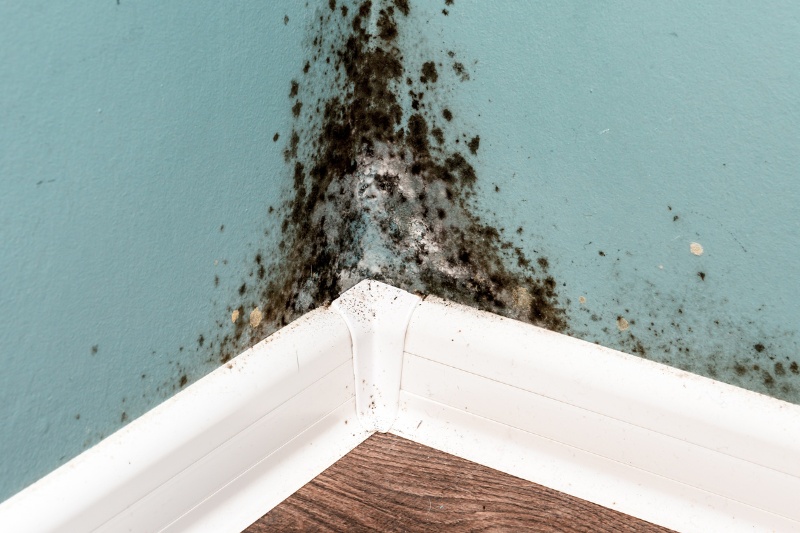
The most common cause of your earthy smell is likely to be mould and mildew.
Mould and mildew are often described as having a very musky, earthy scent. So, the odour you’re smelling at home could be an indicator that you’ve got a moisture-related problem developing.
It may not be a very big issue, and if you treat the problem quickly, the whiffy odour may go away within a few days.
Mould is typically black or green in colour, and you find patches of it in high moisture areas.
Mildew, on the other hand, grows on the surface of objects, and it’s normally grey or white in colour.
You should be able to spot mould and mildew fairly quickly because the marks are normally unsightly and fairly obvious.
However, if you’re not sure where to start looking, you’ll typically find lots of moisture in bathrooms, kitchens and utility rooms.
It’s also not uncommon to see bedroom walls covered with dark patches of mould, especially if your bedroom walls get cold.
You’ll typically find mould and mildew in the following areas:
- Where there’s a leak (burst pipe).
- Where there’s a build-up of condensation (bathroom/kitchen/on windows).
- In areas with poor ventilation (cluttered cupboards/wardrobes).
- In spaces where water damage has been left untreated, for example under the floor.
- Where wet/damp clothes have been stored in wardrobes.
- Where soaking wet clothes have been left without drying, for example coats/shoes discarded after a walk.
- In appliances that are exposed to water, for example washing machines and dishwashers.
You can fix a mould- or mildew-related problem out by removing and treating the contaminated patch(es) using a mould and mildew remover product.
In addition to this, you should also try to reduce the moisture levels in your home to discourage mould growth (open windows/use a dehumidifier/declutter your home/ensure good airflow).
2. Poor Airflow
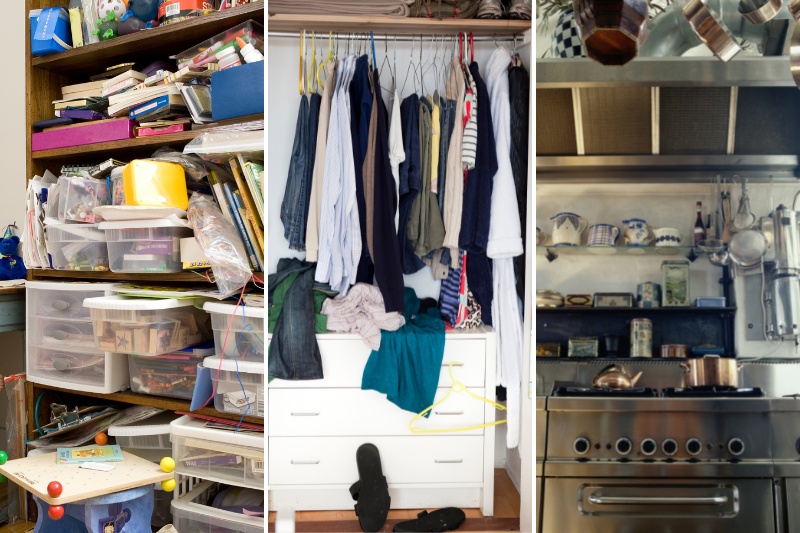
If your home is packed full of stuff, your cupboards are cluttered and your wardrobes are rammed, you may notice an earthy scent in your property.
This is largely because there isn’t enough room for fresh air to flow in and out of these spaces.
In turn, this can lead to a stale, grotty smell in your home, and your clothes and furniture may be a little whiffy too.
If the situation isn’t taken care of, poor airflow can encourage mould and mildew growth.
In addition to this, if you’ve been away for a few weeks, and your windows and doors haven’t been opened, your home may smell a little earthy.
Again, this can be put down to poor airflow, and can usually be treated by opening some windows!
There a several ways of managing airflow:
- Declutter your wardrobes—donate or bin clothes that are no longer suitable.
- Open your wardrobe doors, so air can flow inside.
- Sort through your cupboards and put unwanted items in the rubbish bin/give food to a food bank if it’s in date.
- Open the windows.
- Use fans to circulate the air in your home.
- Make use of extractor fans.
- Don’t put your furniture flush against the walls. Instead, leave a gap.
3. Stains and Aged Dirt on Floors
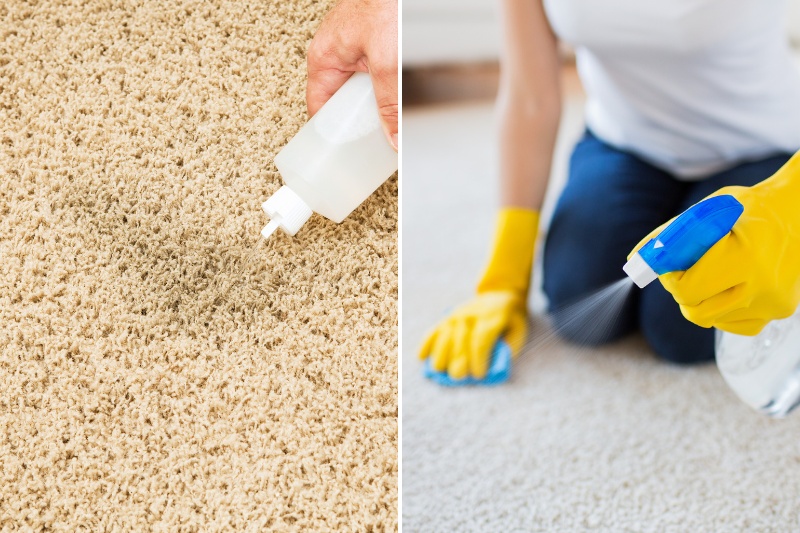
An earthy smell in your home could be caused by an ingrained stain, or a patch of ground in mud on your carpet.
If you don’t treat a stain and clean dirt away, it will get tangled in your carpet’s fibres, and in turn, the carpet will become pongy.
A stained carpet isn’t nice to look at and it certainly isn’t good for your poor nose!
Cleaning the carpet is the only way to deal with such a problem. So, if you can spot treat the carpet do so, but if you think you need a more powerful tool to clean the entire surface you should rent a carpet cleaner.
You can rent a carpet cleaner from Rug Doctor, which you can collect from various stores including Tesco, Asda, B&Q and The Range. This specialised tool, coupled with a stronger cleaning solution, will remove the horrid odour and any stains from your carpet.
4. Muddy Shoes and Wellies
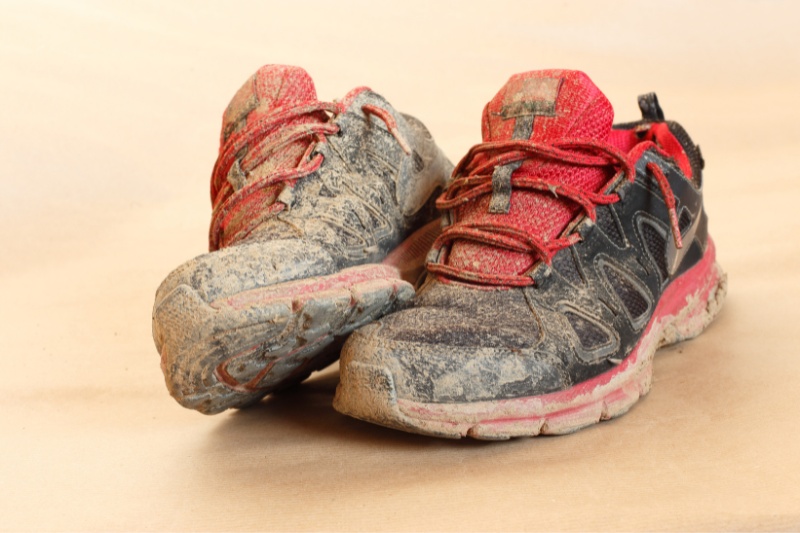
If you’ve been out for a walk through the muddy countryside, you should clean your wellingtons or walking shoes when you get home.
If you don’t remove the dirt, the earth will dry on the shoes, and the soily smell will start to permeate throughout your home.
Where you keep your footwear, like under the stairs, porch, wardrobe, cloakroom, will also become overrun with an earthy, outdoorsy odour that won’t be very pleasant for you.
The stench will eventually start wafting through the hallway, and then the entire home will be masked by the muddy aroma.
You must clean your shoes, so they don’t smell. And if you maintain your footwear, it should have a better lifespan and shouldn’t fall apart as easily!
5. Pets
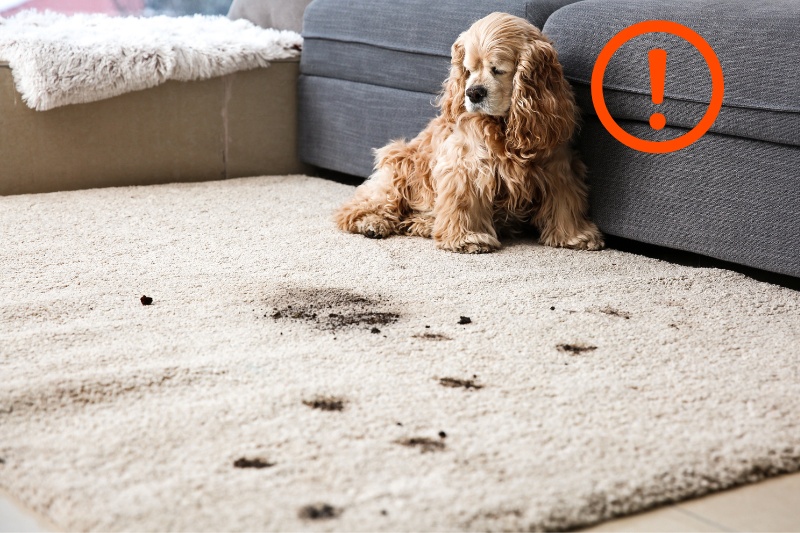
A morning stroll with your pooch after a night of heavy rainfall sounds like a great idea, until the inevitable happens… Your buddy discovers the puddles!
Yep, your four-legged pal will likely find every pool of water to jump into, and they’ll roll themselves around in each mud pit they pass by!
It’s all good fun when you’re outdoors! But it’s a totally different story when you get home, and the house becomes caked in earth and water!
In short, the earthy smell you’ve got in your home could just be the smell of your pet and the grime it’s brought home!
It’s really not uncommon for homes to take on a more outdoorsy sort of smell when the rain and winter starts to take hold. Especially when you’ve got animals living in the house.
Pets, in particular dogs, are going to go outside to play in the wet weather, and they’re going to bring the smell of nature in with them.
You can’t avoid the situation really; all you can do is manage it.
To take control of this muddy situation, try these tips:
- Wipe your pet when they come back indoors.
- Pop a coat on your pooch when they go outside.
- Corner off any muddy zones in your garden.
- Wash towels as soon as they’ve been used to dry your pet.
- Pop some scented candles on to neutralise the odour.
- Try to stop pets sitting on furniture if they’re damp.
- Give your pet a bath.
- Once your pet is dry, you can spray them with some pet-friendly deodorant.
- Wash pet bedding and blankets frequently during the wetter and muckier months.
- Clean your pet’s collar, harness and lead – they can carry the smell of mud, particularly if they were worn when your pet went through the muck.
6. Mud Has Been Brought into the Home
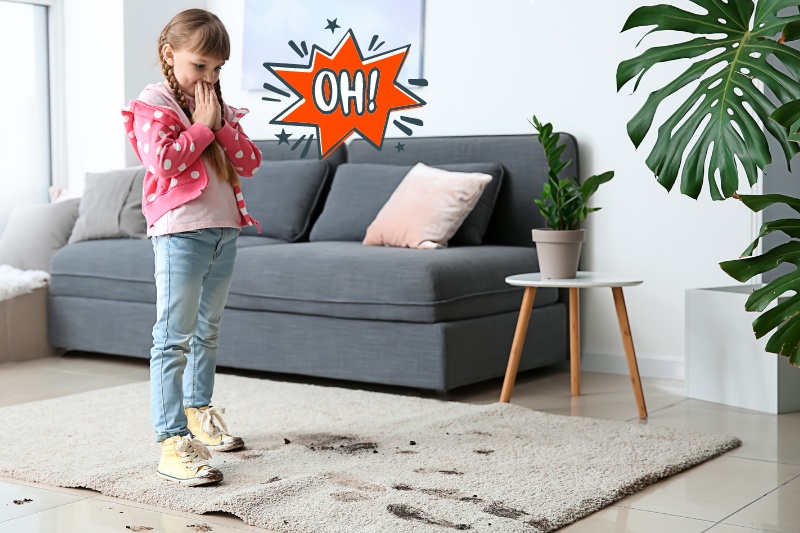
Another common cause for an earthy scent in your home is that earth has actually been brought into your house.
Mud, and the likes, are typically transferred from shoes and paws onto flooring (carpets/tiles), rugs and furniture.
However, these are not the only ways muddy, earthy smells can work their way indoors.
If you’ve got sport enthusiasts in your home, they’re likely to bring several muddy rugby or football kits into the house on a weekly basis.
This extra stinky sportswear will be teaming with mud and grass stains, and will need to be cleaned. It will literally start to reek of earth if it’s left discarded in the wash basket.
Plus, it’s good practice to wash rugby/football kits quickly, because leaving grass stains on clothes can discolour and mark them quite badly!
Similarly, if you’ve taken your kids to the park, they may come home with grass-stained clothes. They also need to be washed, otherwise the earthy smell will fill the house.
The easiest way to stop the above from happening is to:
- Take shoes off at the door and walk barefoot/with slippers through the house.
- You need to wipe your pet’s paws when they re-enter the home.
- Try to put sportswear/earth-stained clothes in the wash as soon as possible, and don’t carry it throughout the house.
- It’s also worth popping an absorbent mat by the door, so it can catch any water and mud. Of course, you’ll have to wash the mat frequently because it’ll be situated in a high traffic area and will be exposed to lots of dirt.
7. Indoor Plants
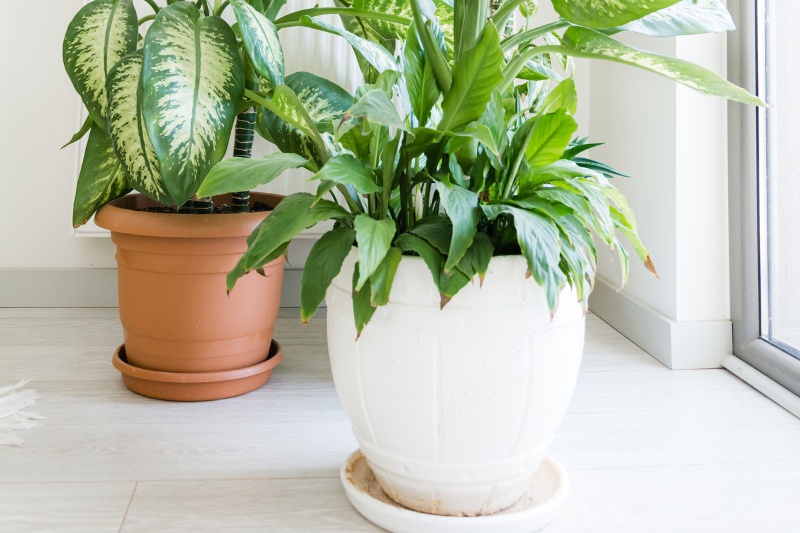
If you’ve got a few indoor plants scattered around your home, but you sometimes over-water them, you might get a musty, muddy smell in your home.
The simplest way to deal with this is to remove the excess water, and to give the right amount of water to your plants.
Some plants don’t need to be watered every single day because they can collect moisture from the air that’s in your home.
8. Wet or Uncleaned Piles of Laundry

If you’ve not dried your laundry, the wet pile of clothes will eventually start smelling very stale, and almost earthy. It can be a very off-putting type of stench. And in a lot of cases, you’ll have to re-wash the laundry, just to make it smell clean again.
You should also avoid doing this too often because you’re essentially leaving a large pile of idle moisture sitting in your home. This, in turn, can encourage mould and mildew growth.
On the flipside of this, if you leave lots of muddy clothing in the wash basket, like rugby kits, the basket is going to start smelling really bad.
Eventually, the sweaty, mucky odour will permeate throughout the house, and it can even contaminate other items in the wash basket! Yucky!
Washing dirty clothes is the best way to stop this from happening.
9. Blocked Vents
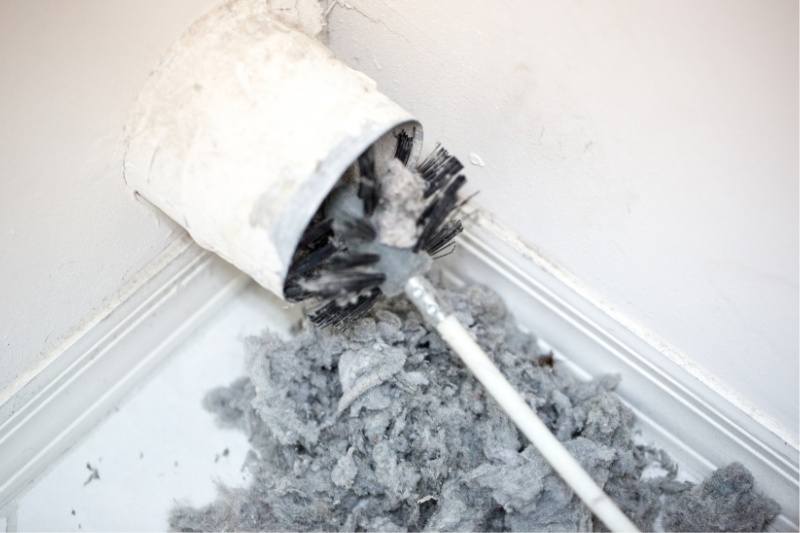
An earthy smell could be a sign of a clogged vent in your home. If you suspect this to be the case, you should sniff each vent in your property, until you find the offending one. You can then clean and unblock the vent to see if it solves the problem.
If the problem persists, you may need to call a professional in to help you out.
10. Smelly Vacuum Cleaner
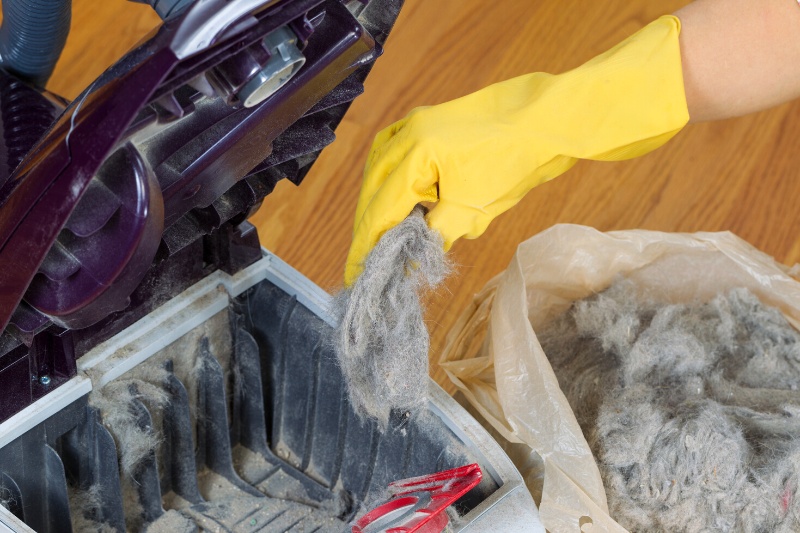
Vacuum cleaners pick up all different types of smelly dirt, including mud, pet hair and food. So, there’s a very good chance that the bag inside your hoover, or its dust canister, will be bursting with a blend of unpleasant earthy aromas!
If you hoover your home with the smelly bag/canister in situ, you’ll end up spreading the odour around your home.
Taking the bag out and replacing it is the best solution. Or if you’ve got a dust container, you need to empty it.
11. Construction Work

If your earthy odour has just sprung up, and there’s no real cause for it, have a look outside your house to see what’s going on. Someone near you could be digging up earth, and the aroma could be wafting into your home. It really could be as simple as this, and the odour may just go on its own.
Of course, the stench may get worse if the earth is exposed to lots of rain water. But it should only be a temporary issue.
How to Get Rid of Earthy Smells in the House
Step 1: Find the cause of the problem
When you first smell the earthy aroma, you should try and find where it’s coming from. If an issue is caught and dealt with early enough, it can usually be treated and cured with very little trouble.
So, try and follow the scent if you can. Look at the walls in your property, check the cupboards, wardrobes, look in your appliances, have a nose behind the sink, and assess your furniture and carpets. You should even go and sniff your laundry basket!
Step 2: Treat the issue
Once you’ve established where the earthy odour is coming from, you can treat the issue. A treatment could be as simple as re-washing damp laundry or giving your carpet a clean.
It could also be a little more troubling, and you might need to call a plumber if you’ve got a leak, for example.
Here are some solutions you can try:
- Open lots of windows and allow plenty of air in and out of the property.
- Use a dehumidifier to remove damp.
- Keep air circulating in your home – use fans and extractor fans.
- Invest in some houseplants.
- Clean your home and dust it frequently. Deep cleaning your home can remove lots of dirt and bad smells!
- If you’ve got a structural issue, for example some untreated rotten floorboards, you may need to call an expert in to help you remove and replace the old boards.
- Clean regularly used spots such as the bath, shower, toilet, and taps.
- Clean the washing machine, so no mould grows in it.
- Use air fresheners.
- Wash muddy shoes and paws before they enter the house.
- Make sure clothes, shoes, blankets, towels and mats are all dry before storing them.
- Declutter your home, so lots of air can flow around the place.
- Boil some lemons on the stove and use them as a natural deodoriser.
- Treat mould and mildew problems as soon as you can! Find out how to get rid of mould off walls, curtains and wardrobes.
- Use odour absorbers, like bicarbonate of soda, ground coffee and kitty litter to absorb the earthy smell in your home.
- Try to avoid bringing mud into your home. And if you can’t avoid it, have a mat by the door and wash muddy clothes quickly.

Step 3: Stop the earthy smell coming back
Here are a few ways you can stop the earthy odour from returning:
- Ensure there’s good airflow in your home.
- Fix leaks before they cause havoc.
- Remove mould as soon as possible.
- Paint walls with mould and mildew treatments.
- Make sure the laundry is dry before you put it away.
- Clean dirty laundry often.
- Open windows and doors frequently.
- Put mats down by the front/back door, so people can wipe their feet.
- Make use of candles, diffusers and air fresheners.
- Clean shoes and paws.
FAQs on Earthy Smells in the Home
Does an earthy smell always mean mould?
An earthy smell in your home could indicate that mould is present in your property.
However, while this is the most likely culprit, it may not be the only one. There are a number of other potential suspects.
For example, you may actually have earth in your home, or your home could be a touch stale if it’s been sitting empty for a while.
Why does my house smell musty all of a sudden?
Your house could smell musty for many reasons, but the most common one is that it could be the start of a mould issue.
But don’t be disheartened, if caught early you can treat the problem relatively quickly. Plus, the issue may be contained to a particular area in your house, like the shower curtain, so it can be easily cured!
That being said, your home might’ve started smelling for a different reason. You might not have dried a pile of laundry, your carpet might need a clean, or it could just be a very pungent pair of shoes that’s playing havoc with your nose!
It’s a good idea to try and address the cause of the problem as soon as you can. That way you’ll be able to treat, and potentially eradicate the issue before it escalates.
How do you change the natural smell in your house?

If your home isn’t smelling quite as you’d like it to, and you want to change the aroma, try the solutions below:
-
- Clean your home as often as you can, so you remove the unwanted dirt and scents from your house: hoover, wash floors, wipe surfaces, and dust.
- Ensure the carpet is cleaned and is free from stains.
- Use a new type of air freshener that appeals to you.
- Use candles to alter the aroma in your home – you could have a new scent everyday if you wanted to.
- Use diffusers and swap the scents around, so your home always smells different.
- Open the windows to allow fresh air into your home.
- Make some potpourri and boil it.
- Hang plants around the home, like in the kitchen.
- Pop some Bin Buddy in the bin to keep it smelling fruity fresh, and change the scent as often as you like.

Bethan has a passion for exploring, reading, cooking and gardening! When she’s not creating culinary delights for her family, she’s concocting potions to keep her house clean!






